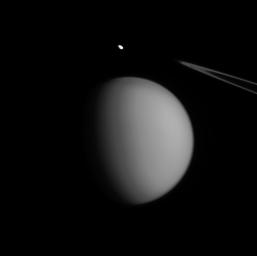Titan’s Accent Mark
Caption:
A coincidence of viewing angle makes Pandora appear to be hovering over Titan, almost like an accent mark.
Little Pandora is much closer to Cassini than hazy Titan in this view. (Titan is nearly three times farther away.) Even so, Titan (3,200 miles or 5,150 kilometers across) dwarfs Pandora (50 miles or 81 kilometers across). This gives us some sense of the diversity in sizes, and shapes, of Saturn's many moons.
North on Titan is up and rotated 19 degrees to the right. The image was taken in visible green light with the Cassini spacecraft narrow-angle camera on July 4, 2015.
The view was acquired at a distance of approximately 1.2 million miles (1.9 million kilometers) from Titan. Image scale is 7 miles (12 kilometers) per pixel on Titan. Pandora is at a distance of 436,000 miles (698,000 kilometers) away from the spacecraft. The scale on Pandora is about 3 miles (4 kilometers) per pixel.
Background Info:
The Cassini mission is a cooperative project of NASA, ESA (the European Space Agency) and the Italian Space Agency. The Jet Propulsion Laboratory, a division of the California Institute of Technology in Pasadena, manages the mission for NASA's Science Mission Directorate, Washington. The Cassini orbiter and its two onboard cameras were designed, developed and assembled at JPL. The imaging operations center is based at the Space Science Institute in Boulder, Colorado.
For more information about the Cassini-Huygens mission visit
http://saturn.jpl.nasa.gov
and
http://www.nasa.gov/cassini
. The Cassini imaging team homepage is at
http://ciclops.org
.
Cataloging Keywords:
| Name |
Value |
Additional Values |
| Target |
Titan |
Pandora |
| System |
Saturn |
|
| Target Type |
Satellite |
|
| Mission |
Cassini-Huygens |
|
| Instrument Host |
Cassini Orbiter |
|
| Host Type |
Orbiter |
|
| Instrument |
Imaging Science Subsystem (ISS) |
|
| Detector |
Narrow Angle Camera |
|
| Extra Keywords |
Atmosphere, Grayscale, Haze, Rotation, Visual |
| Acquisition Date |
|
| Release Date |
2015-10-05 |
| Date in Caption |
2015-07-04 |
|
| Image Credit |
NASA/JPL-Caltech/Space Science Institute |
| Source |
photojournal.jpl.nasa.gov/catalog/PIA18338 |
| Identifier |
PIA18338 |

 Planetary Data System
Planetary Data System
